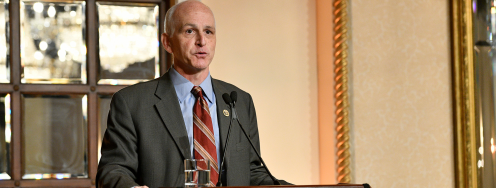When King Aerys Targaryen, in the throes of madness, orders his men to ignite the stores of wildfire in the city of King’s Landing to "burn them all," Jaime Lannister, head of the Kingsguard in the Game of Thrones story, refuses to carry out the order. Rather than kill the five hundred thousand inhabitants of the capital, he kills the "Mad King" instead.
What if a mad president orders the death of hundreds of thousands of innocents? Would his officers obey?
This is no fantasy. This week, former Director of National Intelligence James Clapper joined a long list of former officials and experts worried about President Trump’s mental stability and his unimpeded ability to launch a nuclear war. Trump could "burn them all" almost as easily as he can launch a tweet.
Clapper described a plausible scenario with North Korea. "In a fit of pique he decides to do something about Kim Jong-un, there’s actually very little to stop him," Clapper warned, "The whole system is built to ensure rapid response if necessary. So there’s very little in the way of controls over exercising a nuclear option, which is pretty damn scary."
Dozens of articles have now been written about our obsolete Cold War command structure that makes the US president a nuclear king: He and he alone has the authority to launch our nuclear weapons. Once he gives the command, no one can overrule him. Four minutes after the order, nuclear missiles would be flying. They cannot be recalled or destroyed. Thirty minutes after launch, they would detonate on their targets.
David Corn details the process and how little can be done to stop a determined president in a recent Mother Jones article. "Trump is an angry man obsessed with revenge and lacking knowledge about nuclear weapons," he warns, "Yet now he has this end-it-all capability, and national security experts are worried, if not frightened."
Still, we live in a state of denial. Surely, we reason, the president wouldn’t actually do this? Surely, if he did, someone would stop him? Not in a Lannister way, certainly, but physically prevent the president, right?
We are biased towards the status quo. This has never happened, therefore, it is unlikely to happen.
But the Trump presidency is filled with things that have never happened. This is a man who cannot be trusted to give an unscripted speech for five minutes without saying something crazy. A man for whom a Google search of "Trump unhinged" returns more than 6 million results. A man The Los Angeles Times this week called "reckless and unmanageable, a danger to the Constitution, a threat to our democratic institutions."
Chief of Staff John Kelly has tried to control Trump by restricting the flow into and out of the Oval Office, but this is a president who does not spend much time in the Oval Office. And at all times, everywhere, a military officer follows him with the "nuclear football" containing the codes for launching one or one thousand nuclear weapons.
Let me describe a likely scenario for how Trump could start a nuclear war – and then describe how we can prevent this.
How a Nuclear War Could Start
Eleven times since this May, US B-1 bombers have flown from the island of Guam practicing dropping bombs on North Korean targets. When North Korea in early August denounced the latest practice run as a war threat, Trump issued his infamous "fire and fury" threat provoking a crisis that many feared could spill into war. North Korea responded with a plan to test fire its missiles just short of Guam.
Imagine that tensions rise again with North Korea and during those tensions US bombers again fly towards the peninsula. This time, Kim Jong-un decides to order intermediate-range missiles to fly towards Guam. They come very close to the island and the US THAAD anti-missile system based there tries and fails to intercept them. The events occur late in the evening in Eastern time and a frustrated Donald Trump, with few staff around him, determined to look strong and battered by domestic political developments and investigations, responds furiously, ordering a US strike on North Korean test sites using nuclear weapons.
Such a "limited" strike is one of dozens already in the briefing books in the nuclear football. It is designed by the US military and repeatedly drilled over the years. A command to execute the strike would be unprecedented but not unanticipated. In a time of tension, it is highly unlikely that anyone in the chain of command would refuse such an order. Some would welcome it. As former nuclear missile command officer Bruce Blair recently wrote about an even larger strike order, "I believe the nuclear commanders at all levels would obey such an order, despite deep misgivings about its wisdom and legality."
Even if the US strikes destroyed all their targets, North Korea’s conventional military capabilities, unleashed in response, would kill hundreds of thousands of South Koreans in the first few hours of combat. The resulting war would kill millions and destroy South Korea, the eleventh largest economy in the world, triggering a global financial crisis. If some North Korean nuclear weapons survived, Kim would surely use them, with the death toll climbing.
Yes, it would be a war fought "over there," as Senator Lindsay Graham ruthlessly said, but its consequences would be global. And most of the 150,000 Americans living in South Korea would likely die "over there."
How A Nuclear War Can Be Prevented
What can be done? The long-term solution is to eliminate nuclear weapons. They are an obsolete vestige of the last century. We don’t need them. There has not been a military mission that required their use in over 72 years. Now, as the "rationality of deterrence" erodes, as former German Foreign Minister Joschka Fischer warns, the threshold for using nuclear weapons will fall.
"We have to ask ourselves whether we really think that no leader would ever be so reckless as to plunge us into the nuclear abyss," writes nuclear weapons expert Jeffrey Lewis this week in The Washington Post, "and that mutually assured destruction can be safely relied upon indefinitely to preserve the peace."
This is exactly why hundreds of former officials and military leaders and thousands of non-governmental leaders have concluded that we have to eliminate nuclear weapons before they eliminate us. And why more than 120 nations recently voted this year at the United Nations for a treaty to ban all nuclear weapons. But we do not have to wait for world governments to deliver on their pledges of nuclear disarmament. There is a practical, near-term circuit breaker we can put in between a US president and preemptive nuclear war: We can require that the US Congress fulfill its constitutional responsibility to authorize such a war before it begins.
There is a bill before Congress to do exactly this. HR 669 introduced by Representative Ted Lieu (D-CA) and the identical S. 200 introduced by Senator Ed Markey (D-MA) would prohibit a president from launching a nuclear first strike without a declaration of war by Congress.
The measure has attracted some high-powered endorsements. "During my period as Secretary of Defense, I never confronted a situation, or could even imagine a situation, in which I would recommend that the President make a first strike with nuclear weapons—understanding that such an action, whatever the provocation, would likely bring about the end of civilization," said William Perry. "I believe that the legislation proposed by Congressman Lieu and Senator Markey recognizes that terrible reality. Certainly a decision that momentous for all of civilization should have the kind of checks and balances on Executive powers called for by our Constitution."
There are other possible solutions, such as mandating that the "two-man rule" that is required to actually launch a nuclear weapon be required at the very top, with the secretary of defense or another senior official having to approve a strike command. The Markey-Lieu bill has the advantage of actually being before Congress now, having the force of law if enacted, and being the more responsible, constitutional approach.
It would end the current nuclear monarchy. Starting a nuclear war is the most consequential act any president can take and it is the least democratic process in our entire government. No one person should have the ability to destroy within minutes all that humanity has created over the millennia.
Dangerously, as investigations close in on the president, as he grows more isolated, the temptation to distract and disrupt political processes with military actions will grow. We cannot rely on the status quo holding, or await the arrival of some fantasy heroes to stop a mad leader from launching a wild nuclear fire that would "burn them all."
We must be the heroes. When Congress returns in September, we should pressure our representatives to have this at the top of their agenda.
Originally published in Huffington Post, August 24, 2017
Learn about the "Nuclear Monarchy" and how you can support efforts to #RestrictFirstUse.





